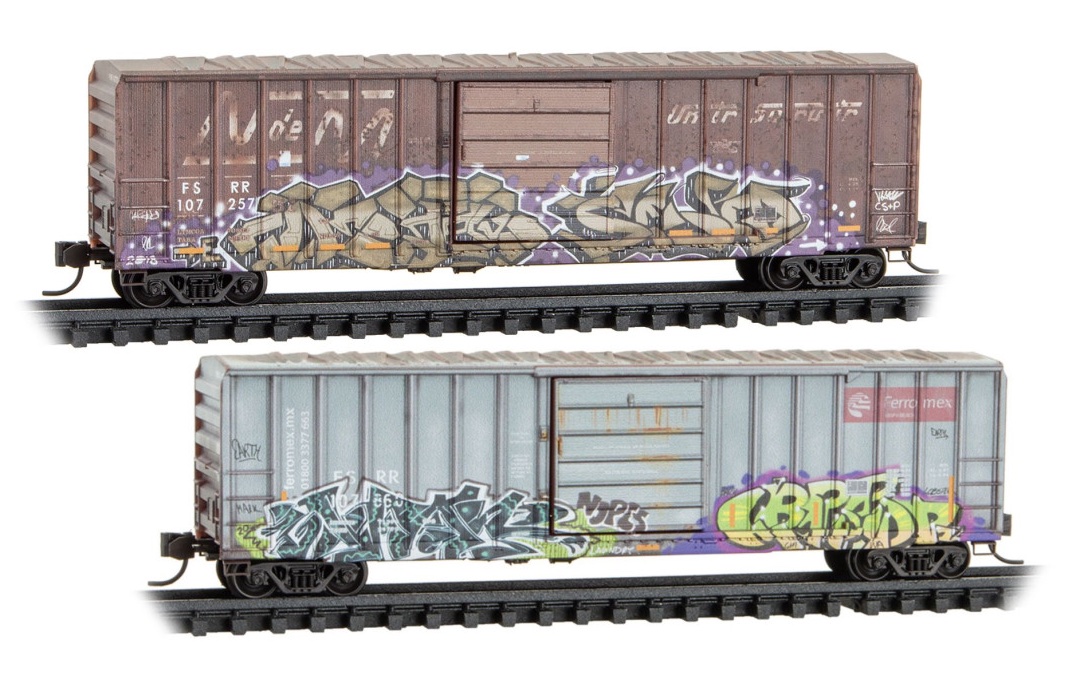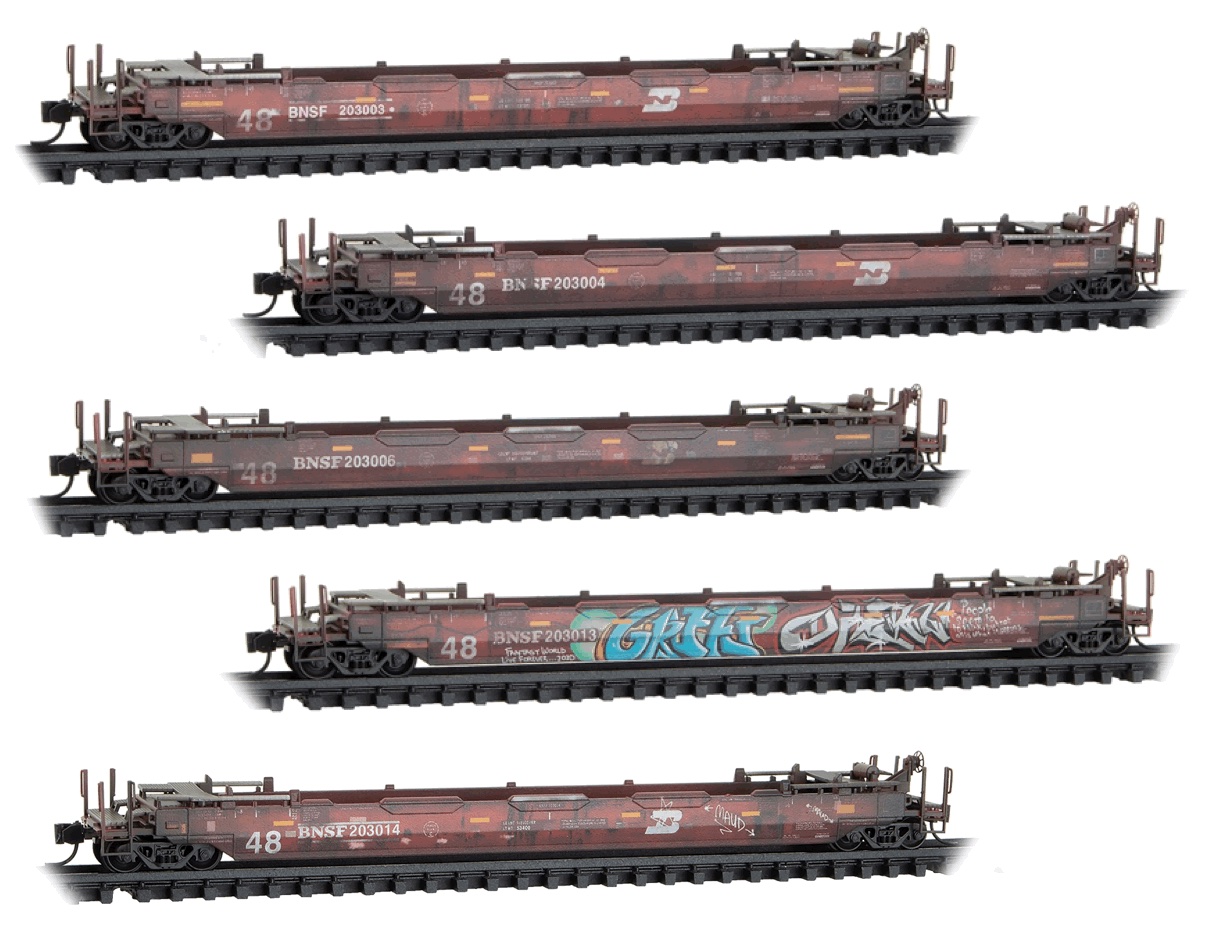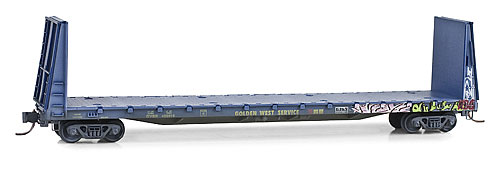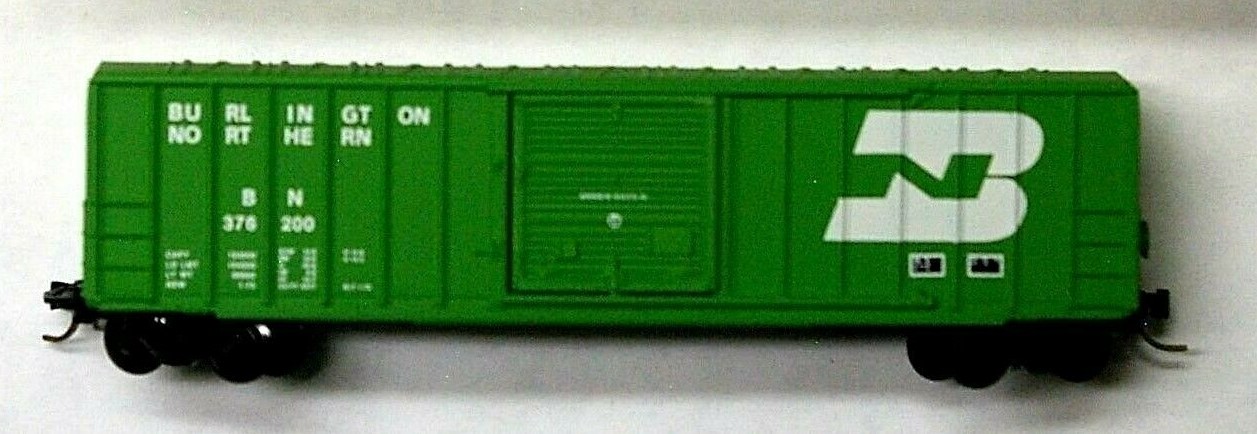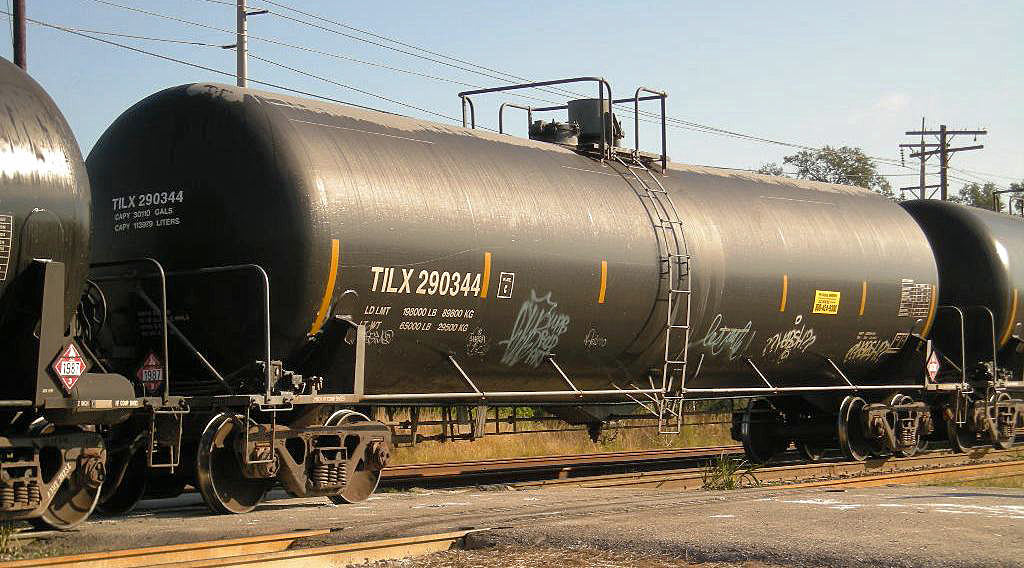Specific Item Information: These 56’ general service tank cars are black with large orange herald and run on Barber Roller Bearing trucks. Built in 1962, these non-insulated petroleum tank car were part of the Gulf Oil 20000-20008 series. At a 20,427 gallon capacity, this car was equipped with heater coils. Gulf Oil traces its roots to 1901 when oil was discovered in Spindletop, Texas. Within 20 years, Gulf had become one of the largest oil companies in the world.
Model Information: Model Introduced: August, 2001. Era: 1970s to Present. It is a model of a DOT 111 A100 tank car.
Prototype History: Larger 50+ foot yank cars replaced their smaller predecessors in the late 1960s and 1970s. One example is the class DOT 111 A100. This car is rated for non-pressurized use with a safe maximum operating pressure of 100 psi. Developments in materials and manufacturing allowed this tanker to be constructed without an underframe. The bottom of the tank itself serves as the load bearing structure. The primary difference between the various types of DOT 111 A100 class tank cars is internal with varying types of insulation, lining and even weld material. Cars of this type haul a wide variety of commodities such as gasoline, vegetable oils, corn syrup, fruit juice and weed killers.
Road Name History: 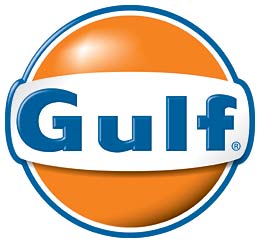 When the company that was to be known as Gulf was born in 1901 with an oil discovery in Spindletop, Texas, the primary commercial fuel was coal. By 1903, the age of mechanization had arrived and it was now up to the petroleum industry to keep pace, for the age could not proceed without it. Gasoline development, into which Gulf invested millions of dollars, responded to advances in automotive technology to make the modern motorcar possible. Within a dozen years of Spindletop, Gulf scored notable firsts with the world?s first drive-in service station, complimentary Gulf road maps and over water drilling at Ferry Lake. In 1917, the Gulfstream went into World War I service, along with the rest of Gulf's tanker fleet.
When the company that was to be known as Gulf was born in 1901 with an oil discovery in Spindletop, Texas, the primary commercial fuel was coal. By 1903, the age of mechanization had arrived and it was now up to the petroleum industry to keep pace, for the age could not proceed without it. Gasoline development, into which Gulf invested millions of dollars, responded to advances in automotive technology to make the modern motorcar possible. Within a dozen years of Spindletop, Gulf scored notable firsts with the world?s first drive-in service station, complimentary Gulf road maps and over water drilling at Ferry Lake. In 1917, the Gulfstream went into World War I service, along with the rest of Gulf's tanker fleet.
Gulf Oil, now headquartered in Wellesley Hills, Massachusetts was purchased by ArcLight Capital Partners, LLC, an industry leading Private Equity Sponsor, and has since merged with Petroleum Products Corporation. With an extensive distribution network, the company supplies motor fuels through 17 owned and operated terminals and more than 1,800 Gulf branded gas stations and service stations, as well as heating oil, diesel fuel, jet fuel and kerosene, across the East and Gulf Coasts. Through its highly diversified assets and experienced management team, Gulf plans to expand its footprint throughout the Gulf Coast and eventually through North America.

Gulf Oil, now headquartered in Wellesley Hills, Massachusetts was purchased by ArcLight Capital Partners, LLC, an industry leading Private Equity Sponsor, and has since merged with Petroleum Products Corporation. With an extensive distribution network, the company supplies motor fuels through 17 owned and operated terminals and more than 1,800 Gulf branded gas stations and service stations, as well as heating oil, diesel fuel, jet fuel and kerosene, across the East and Gulf Coasts. Through its highly diversified assets and experienced management team, Gulf plans to expand its footprint throughout the Gulf Coast and eventually through North America.
Brand/Importer Information: Micro-Trains is the brand name used by both Kadee Quality Products and Micro-Trains Line. For a history of the relationship between the brand and the two companies, please consult our Micro-Trains Collector's Guide.
Manufacturer Information:  Micro-Trains Line split off from Kadee Quality Products in 1990. Kadee Quality Products originally got involved in N-Scale by producing a scaled-down version of their successful HO Magne-Matic knuckle coupler system. This coupler was superior to the ubiquitous 'Rapido' style coupler due to two primary factors: superior realistic appearance and the ability to automatically uncouple when stopped over a magnet embedded in a section of track. The success of these couplers in N-Scale quickly translated to the production of trucks, wheels and in 1972 a release of ready-to-run box cars.
Micro-Trains Line split off from Kadee Quality Products in 1990. Kadee Quality Products originally got involved in N-Scale by producing a scaled-down version of their successful HO Magne-Matic knuckle coupler system. This coupler was superior to the ubiquitous 'Rapido' style coupler due to two primary factors: superior realistic appearance and the ability to automatically uncouple when stopped over a magnet embedded in a section of track. The success of these couplers in N-Scale quickly translated to the production of trucks, wheels and in 1972 a release of ready-to-run box cars.
Micro-Trains Line Co. split off from Kadee in 1990 to form a completely independent company. For this reason, products from this company can appear with labels from both enterprises. Due to the nature of production idiosyncrasies and various random factors, the rolling stock from Micro-Trains can have all sorts of interesting variations in both their packaging as well as the products themselves. When acquiring an MTL product it is very important to understand these important production variations that can greatly enhance (or decrease) the value of your purchase.
Please consult our Micro-Trains Collector's Guide

Micro-Trains Line Co. split off from Kadee in 1990 to form a completely independent company. For this reason, products from this company can appear with labels from both enterprises. Due to the nature of production idiosyncrasies and various random factors, the rolling stock from Micro-Trains can have all sorts of interesting variations in both their packaging as well as the products themselves. When acquiring an MTL product it is very important to understand these important production variations that can greatly enhance (or decrease) the value of your purchase.
Please consult our Micro-Trains Collector's Guide
Item created by: gdm on 2017-08-30 14:09:12. Last edited by George on 2024-01-26 20:29:06
If you see errors or missing data in this entry, please feel free to log in and edit it. Anyone with a Gmail account can log in instantly.
If you see errors or missing data in this entry, please feel free to log in and edit it. Anyone with a Gmail account can log in instantly.




